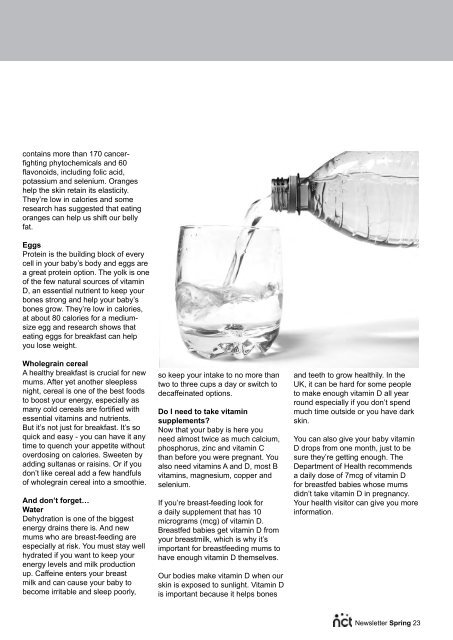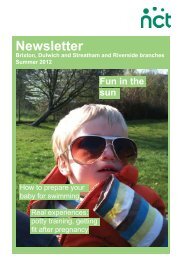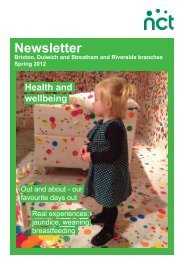Newsletter - Mandy Mazliah
Newsletter - Mandy Mazliah
Newsletter - Mandy Mazliah
You also want an ePaper? Increase the reach of your titles
YUMPU automatically turns print PDFs into web optimized ePapers that Google loves.
contains more than 170 cancerfighting<br />
phytochemicals and 60<br />
flavonoids, including folic acid,<br />
potassium and selenium. Oranges<br />
help the skin retain its elasticity.<br />
They’re low in calories and some<br />
research has suggested that eating<br />
oranges can help us shift our belly<br />
fat.<br />
Eggs<br />
Protein is the building block of every<br />
cell in your baby’s body and eggs are<br />
a great protein option. The yolk is one<br />
of the few natural sources of vitamin<br />
D, an essential nutrient to keep your<br />
bones strong and help your baby’s<br />
bones grow. They’re low in calories,<br />
at about 80 calories for a mediumsize<br />
egg and research shows that<br />
eating eggs for breakfast can help<br />
you lose weight.<br />
Wholegrain cereal<br />
A healthy breakfast is crucial for new<br />
mums. After yet another sleepless<br />
night, cereal is one of the best foods<br />
to boost your energy, especially as<br />
many cold cereals are fortified with<br />
essential vitamins and nutrients.<br />
But it’s not just for breakfast. It’s so<br />
quick and easy - you can have it any<br />
time to quench your appetite without<br />
overdosing on calories. Sweeten by<br />
adding sultanas or raisins. Or if you<br />
don’t like cereal add a few handfuls<br />
of wholegrain cereal into a smoothie.<br />
And don’t forget…<br />
Water<br />
Dehydration is one of the biggest<br />
energy drains there is. And new<br />
mums who are breast-feeding are<br />
especially at risk. You must stay well<br />
hydrated if you want to keep your<br />
energy levels and milk production<br />
up. Caffeine enters your breast<br />
milk and can cause your baby to<br />
become irritable and sleep poorly,<br />
so keep your intake to no more than<br />
two to three cups a day or switch to<br />
decaffeinated options.<br />
Do I need to take vitamin<br />
supplements?<br />
Now that your baby is here you<br />
need almost twice as much calcium,<br />
phosphorus, zinc and vitamin C<br />
than before you were pregnant. You<br />
also need vitamins A and D, most B<br />
vitamins, magnesium, copper and<br />
selenium.<br />
If you’re breast-feeding look for<br />
a daily supplement that has 10<br />
micrograms (mcg) of vitamin D.<br />
Breastfed babies get vitamin D from<br />
your breastmilk, which is why it’s<br />
important for breastfeeding mums to<br />
have enough vitamin D themselves.<br />
Our bodies make vitamin D when our<br />
skin is exposed to sunlight. Vitamin D<br />
is important because it helps bones<br />
and teeth to grow healthily. In the<br />
UK, it can be hard for some people<br />
to make enough vitamin D all year<br />
round especially if you don’t spend<br />
much time outside or you have dark<br />
skin.<br />
You can also give your baby vitamin<br />
D drops from one month, just to be<br />
sure they’re getting enough. The<br />
Department of Health recommends<br />
a daily dose of 7mcg of vitamin D<br />
for breastfed babies whose mums<br />
didn’t take vitamin D in pregnancy.<br />
Your health visitor can give you more<br />
information.<br />
<strong>Newsletter</strong> Spring 23





